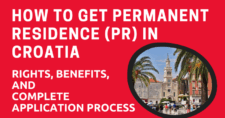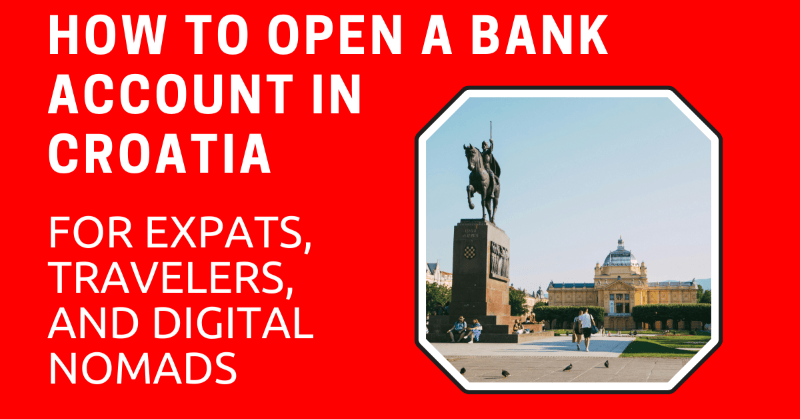
This article will take approximately 22 minutes to read. Don't have the time right now? No worries. Email the ad-free version of the article to yourself and read it later!
If you ask how safe is Croatia when holding cash? I can confidently say, “Very.” Here, you rarely encounter grab-and-run thefts like you might in Spain, Milan, or Paris where you have to clutch your bag tightly until your arm aches. But if you ask whether you often receive incorrect change when using cash? Let me tell you, “quite frequently.”
Even though many might not consider opening a bank account in Croatia, if you plan to stay here long-term, having a local bank account can greatly simplify money management—whether it’s paying rent, receiving or sending money, paying for utilities, internet, or shopping at the supermarket.
Let’s take a look at the steps involved in opening a bank account in Croatia, as well as the required documents, fees, and other related details.
Disclaimer: This article may include links to products or services offered by ExpatDen's partners, which give us commissions when you click on them. Although this may influence how they appear in the text, we only recommend solutions that we would use in your situation. Read more in our Advertising Disclosure.
Contents
- Key Takeaways
- Benefits of Having a Bank Account in Croatia
- Popular Banks in Croatia for Expats
- Types of Bank Accounts that Expats Can Open in Croatia
- Required Documents
- Steps to Open a Bank Account in Croatia
- Money Transfer
- Can Expats Open an Online Bank Account in Croatia?
- Can Tourists Open a Bank Account in Croatia?
- Bank Account Alternatives
- Now, on to You
Key Takeaways
- A bank account in Croatia is a crucial tool for expats, workers, retirees, and digital nomads. It makes managing finances more convenient, whether for receiving salaries, paying bills, or handling day-to-day transactions.
- Popular banks that cater to expats include Zagrebačka banka (ZABA), PBZ, Erste Bank, OTP Banka. Each has its strengths and limitations, so you should compare them before choosing.
- The main types of accounts you can open are savings accounts, suitable for saving, and checking accounts, suitable for daily use. The fees and conditions vary by bank.
- To open an account, you need an OIB (personal identification number), proof of residence, and other financial documents. The process may differ from bank to bank.
- Alternatives to local banks like Wise, Revolut, or N26 are suitable for travelers or those who don’t want to open a direct bank account in Croatia.
Benefits of Having a Bank Account in Croatia
If you’re planning to stay in Croatia for a long time, whether to study or work, or to try your hand at business, having a bank account here makes life a lot easier than you think. From receiving your paycheck, paying rent, utility bills, to buying small stuff, it really saves both money and time.
I’ve been there myself. When I relocated to Croatia for work but couldn’t open a bank account for almost 6 months. It was really tough during that time because I couldn’t receive my salary directly to my account and had to carry cash. Honestly, it was a risky move that could have led to my visa being canceled. But because of some misinformation from the bank, I thought I wasn’t eligible to open an account and ended up carrying cash all the time.
Whenever I went out or walked into a supermarket, my heart would race. I was afraid of losing my wallet, getting the wrong change, or accidentally being scammed, which did happen because the shop ladies at the supermarket often gave the wrong change on purpose. Not to mention I couldn’t transfer money back to Thailand, which made everything so complicated. At first, I used my debit card and tapped to pay. The exchange rate was unstable, and some places charged a percentage fee.
But once I actually opened a bank account, everything changed.
- Salary went in right on time.
- Transferring and paying for anything became convenient.
- Once I got the card, sending money back to Thailand became a lot easier.
- At the supermarket, I could just tap to pay, no more hassle of counting coins.
- Even taking the bus was just a matter of tapping the card, without worrying if I had the right change or enough coins.
- The important thing is there’s no sneaky debit card fee to worry about.
So, if you’re planning to stay for 6 months to a year or more, I suggest opening an account. Aside from handling domestic transactions, you can also use it to pay rent, utilities, and various services by linking your bank account. Even if you’re not planning to stay just in Croatia but want to travel throughout Europe, having a Croatian bank card allows you to tap and pay across Europe with lower fees compared to foreign cards.
Popular Banks in Croatia for Expats
Opening a bank account in Croatia might not offer a vast array of options, especially for expats who have just moved or are staying short-term. However, there are still several big banks known for catering to international clients, offering friendly services, and with branches spread across various cities. I’ve noticed quite a few people are using them, including:
Zagrebačka Banka (ZABA)
If you need a bank that’s convenient and covers all the bases ZABA It’s the best choice as it’s the largest bank in Croatia and is considered one of the most influential financial institutions in Central and Eastern Europe.
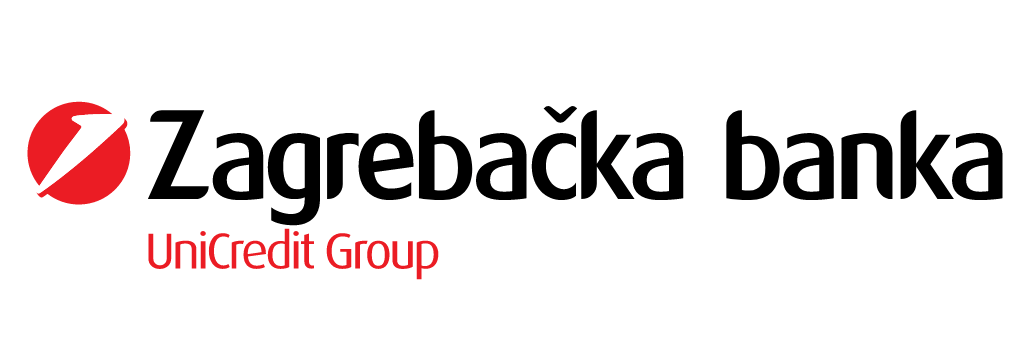
This bank can be accessed 24/7 via e-zaba and m-zaba, allowing you to check balances, transfer funds, and support paperless bill payments (i-Bills). Scanning to pay is easy and convenient when shopping at restaurants or supermarkets.
However, ZABA may have limitations regarding the number of ATMs in Croatia, especially in coastal cities like Split or Dubrovnik, and other remote areas, making it sometimes necessary to travel far for transactions.
When I was in Split, friends who used this bank often complained that depositing or withdrawing cash wasn’t very convenient because most ATMs are in major cities, and banks located in villages are few. So when there’s important business or a need for transactions, additional time for travel and waiting in line must always be considered.
Privredna Banka Zagreb (PBZ)
If you’re looking for a bank that’s easily accessible with a network of branches and ATMs throughout the country PBZ Another recommended option, this bank is one of the largest in Croatia. It offers comprehensive services including personal accounts, business, loans, and international money transfers.
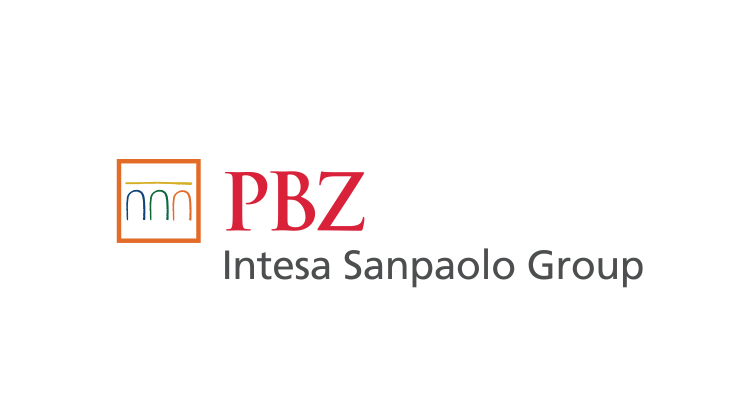
A clear advantage of PBZ is it has the most ATMs in Croatia. You can find them in almost every major city, shopping mall, and transportation center, so you don’t have to worry about finding a cash machine.
However, the account opening fees, card fees, and cash withdrawal fees at PBZ are relatively higher than other banks, which is why local Croatian friends might not recommend using this bank.
Erste & Steiermärkische Bank
For those who have just moved to Croatia and are looking for a reliable bank with a wide network. Erste Bank A great choice if you plan to travel frequently in Europe. This bank is especially convenient since you can access its services in various countries within the Erste Group like Austria, Czech Republic, Slovakia, Hungary, Serbia, and Romania. If traveling from these countries, you can use this bank card immediately without opening a new account, or if you open an account here, it can be used in other countries as well.
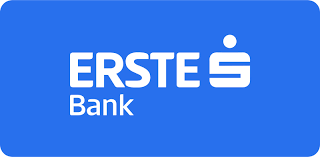
However, some processes, like requesting a new PIN, can take a long time. Even though the application has an English option, some parts are still in Croatian, which requires a bit of adjustment. When my friend went to open an account, they mentioned communication wasn’t consistent at some branches. It required time and patience due to long waiting lines. The service is slow, but once you get used to it, you’ll find that the Erste application and ATMs are easier and more convenient to use than other banks.
OTP Banka
I used it OTP Banka while living in Croatia because many Croatians recommended it. This bank has branches and ATMs almost everywhere and is part of the OTP Group, one of the fastest-growing banking groups in Central and Eastern Europe, ensuring reliability and stability.

The advantages of OTP Banka lie in its convenience and services for expats. The bank offers accounts for expats and foreign currency accounts, making it easy to transfer multiple currencies. It also provides Internet Banking and the OTPgo app that are user-friendly, covering all basic functions, and fees within the network are often reduced or free.
However, from my experience, opening an account requires quite a lot of documentation and can take a considerable amount of time. Plus, transferring money via an app to an exchange app in Thailand can be slow, sometimes taking up to a week. Some friends even had their money transfer frozen and had to visit the branch themselves to verify their identity.
Additionally, some branch staff are locals and not fluent in English, so you’ll need to allow time and patience for transactions. But after using it for a while, everything starts to fall into place and becomes much more convenient.
Types of Bank Accounts that Expats Can Open in Croatia
In general, expats can open two main types of bank accounts in Croatia, similar to locals, though the details and documents required vary depending on the status of the applicant.
Savings Account (Štedni račun)
Ideal for those who want to save money or plan long-term finances. Although the interest rate isn’t high, there are usually restrictions on withdrawals or transactions compared to a current account.
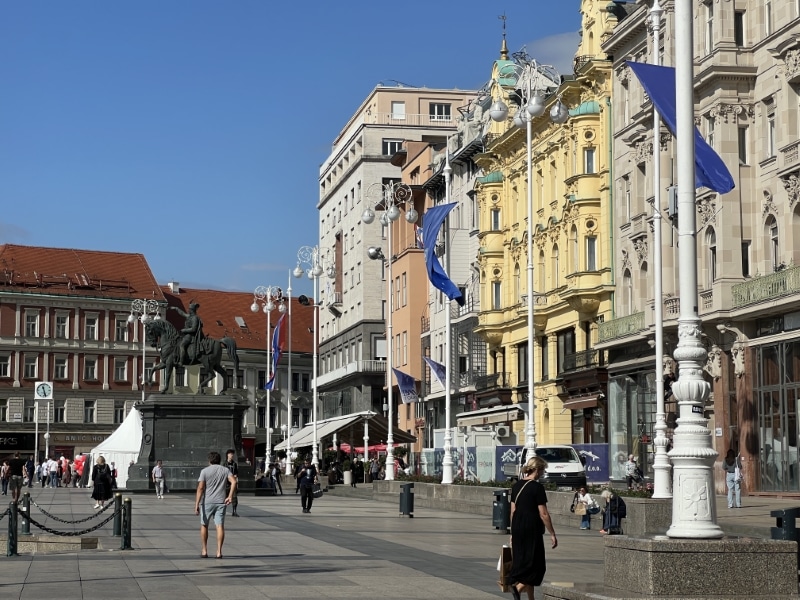
This account is ideal for those not regularly working in Croatia or mainly living there, but who want to save money in euros (EUR), such as retirees in Croatia. Digital nomads in Croatia etc.
However, savings accounts may have limits on withdrawals because they are designed for saving money, not for frequent transactions. Therefore, there might be restrictions on the number of withdrawals and the amount allowed per withdrawal/month, such as 3-5 times. Exceeding these limits may incur higher fees.
Current Account (Tekući račun)
Suitable for those living in Croatia, such as employees, students, and business owners or even retirees. This type of account can handle day-to-day transactions like receiving salaries, paying bills, transferring money, or withdrawing cash.
This account usually comes with a debit card that can be used at ATMs and stores, and it can easily connect to Internet Banking and Mobile Banking services. Withdrawals are convenient with no limit on the number of times. Mostly, ATM withdrawals from the issuing bank are free of charge, but there is a daily limit, and spending via debit card typically depends on the bank’s terms.
Important Note: Costs and conditions, such as monthly fees, transfer fees, or other additional services, vary by bank like PBZ, Erste Bank, OTP Banka, or Zagrebačka banka. Before deciding, compare offers to suit your needs and status in Croatia.
Required Documents
Opening a bank account in Croatia isn’t as complicated as it seems. You just need to prepare all the documents from the start to avoid delays. Generally, every bank will require the following documents:
- OIB number (Personal Identification Number) ***very important
- Proof of address in Croatia
- Passport
- Residency permit/visa
- Address registration certificate from the police station
- Additional financial information (if any), such as an employment contract, proof of income, or minimum deposit (which varies by bank)
- Croatian email and phone number (if any)
Steps to Open a Bank Account in Croatia
From my experience, opening a bank account in Croatia isn’t too complicated, but due to a communication error with the bank staff, I received my bank account later than usual. After arriving in Croatia, I inquired at an OTP banka branch in Split. The staff informed me that I needed to wait as long as 6 months after entering the country before being able to open a bank account.
Later, I went back to open the bank account after the 6 months. The bank staff told me that actually, I could have opened it immediately after entering the country, as long as the necessary documents were complete. They suggested opening one right away if you’re receiving a salary from within the country to ensure proper tax inspection and to prevent fraud. Here are the steps to open a bank account:
1. Request an OIB Number
The crucial first step is to have an OIB number, which is typically provided when applying for any type of residence visa. If you don’t have one, you can request an OIB number at the local tax office (Porezna Uprava), the police station near your home, or if you’re an EU citizen, you can applythrough the e-Citizens system. You must prepare a valid, unexpired passport and complete the application form before submitting the request.
2. Register Address with the Local Police Station
After obtaining an OIB, if you wish to open an account as a resident, you need to register your address with the local police station (MUP) and prepare proof of residence, such as a residency permit or registration proof from the police station.
I recommend informing the officer when applying for the OIB that you will need documents to open a bank account as well. This will save time since the OIB usually takes 4 weeks to issue, and the documents for opening the account can be obtained within 2 weeks, allowing you to pick up both at once without a long wait.
If you want to open an account for a non-resident, it’s still possible, but the account will be classified as non-resident. While the process may be simpler, there are restrictions on services or higher fees.
3. Choose the Right Bank and Account Type
You should compare the requirements, fees, and services of different banks before deciding whether to open a savings account or a checking account. You can generally find information on the websites of banks like PBZ, Erste Bank, OTP Banka, or Zagrebačka banka (ZaBa).
Once you choose a bank that suits your needs, prepare all necessary documents including a passport, OIB, a certificate of residence registration from the police station (for Residents), a residence permit or visa (for long-term residents), financial documents or employment contract (if available), and the minimum account opening deposit, which varies by bank.
When I opened my own account, I had all my documents ready, but the bank still asked for additional proof of address because the account opening was significantly delayed. So, some banks might request additional information as well.
For opening an account with OTP Banka, there are no fees and no minimum deposit. However, if you open the OTPgo app, there is a fee of 0.99 euros, and you will need a Croatian phone number and an email that can receive OTPs from the bank app.
Tip: If you don’t have a Croatian phone number yet, you can use your original home country number, but you’ll need to receive OTPs via email, which is a bit more inconvenient. Afterward, you can request to change to a Croatian number at the bank.
Money Transfer
From my experience, when I transfer over EUR1,000, the amount tends to be pending, and the bank sends an email to verify my purpose for the transfer and confirm that it was actually me making the transaction. However, for my friend, who transferred the same amount, they received a direct call instead, showing that processes may vary depending on each bank’s policies.
Generally, banks in Croatia have specific requirements for transferring and receiving money, especially for expats and those receiving funds from abroad, as follows:
- Receiving money from abroad has no maximum transfer limit, but larger sums may take time to verify. However, if the amount exceeds EUR10,000, it must be declared to customs officials.
- Transferring money within Croatia or SEPA countries uses the SEPA Instant Credit Transfer (SCT Inst) system, which completes transactions in seconds. This means that no matter which bank you use, transfers are equally fast.
- Domestic transfer fees vary from bank to bank, but are generally very low, around EUR0.33, or there might be no fee if it’s within the same bank.
- Some savings and checking accounts, like those from PBZ Bank, may have a small monthly fee, around EUR2.52 per month.
- Transferring money to a bank in the European zone using the Euro currency is simple. You just need the recipient’s International Bank Account Number (IBAN) and the destination bank’s Bank Identifier Code (BIC / SWIFT Code). From my experience, transferring money from an OTP Banka account to a friend in Germany who holds an N26 account cost only EUR0.33, which is very cheap compared to regular international transfers.
Can Expats Open an Online Bank Account in Croatia?
Although many banks in Croatia still focus on account opening at branches, there are now options for expats who want to open an online account, especially for those not residing in Croatia long-term. This makes starting to use an account more convenient without needing to visit a branch.
From asking several friends who have opened online bank accounts in Croatia, they unanimously said it’s not as easy as advertised. Even though banks actively promote online services, the process and requirements for non-European citizens are more complicated than expected, and many websites have outdated information, which can waste time and easily cause confusion.
Another major obstacle is the OIB number. In order to get this number, you need proof of address in Croatia. Although now you can apply online in some cases, overall it seems like you need to be in Croatia first. This makes opening an online account not so convenient or suited for expats.
Examples of banks in Croatia that support online account opening for expats
Raiffeisen Bank
An international-level bank with branches and services in many countries, suitable for expats with its convenient and flexible online account opening system. This eliminates the need to visit a branch for every step, and you can open a non-resident account.
You can open an online account through the application Raiffeisen App. You can download it from the App Store or Google Play Store. Then select the option “Open an account” and fill out the application form with personal and contact information. Of course, you’ll need to include the OIB number because it is crucial for identity verification. So, don’t forget to get your OIB number before filling out the application form.
The next step is identity verification, which is done digitally through a video call with a bank officer. Prepare your identification documents like a passport. Once the identity verification is completed, you’ll sign a digital contract, and the account will be activated immediately. All information will be sent via email, and the debit card will be mailed to you within 7-10 days.
Croatia Banka
This bank allows for online account opening for both residents and non-residents (Non-resident account). The bank’s system supports electronic document submissions and identity verification through video calls, making the account opening process fast and convenient.
Expats, travelers, and digital nomads can choose the account type according to their needs, such as a savings or checking account. Basic necessary documents include a passport, OIB, and proof of address. Then proceed to open the account via the website, CROBAnet (Internet Banking) or app CROBA mBanking by filling out an online form, uploading documents, verifying identity through a video call, and waiting for contract signing, the account will be activated. Account information will be sent via email and you can receive the debit card at home.
Can Tourists Open a Bank Account in Croatia?
Opening a bank account in Croatia is suitable for those who are long-term residents or have a residency permit, as banks often require proof of address, a Tax Identification Number (OIB), and other documents that show a connection to the country. However, the process of obtaining an OIB can take quite some time, longer than what typical tourists would be willing to wait. Therefore, if you’re traveling short-term or don’t have permanent residency, using digital cards like Wise, Revolut or N26 would be a much more convenient and flexible option.
Bank Account Alternatives
Besides opening a local bank account, you can easily use digital financial services in Croatia, whether it’s Wise, Revolut, N26, or even PayPal, which support payment, money transfer, and multiple currencies in a single account.
Wise
Wise This is ideal for people who need to transfer money internationally frequently as the exchange rates are usually better than traditional banks, plus they support holding over 50 currencies. So, no matter where you are in the world, it’s convenient to use. Another highlight is the Wise Multi-Currency card that you can easily use for spending in Croatia.

From personal experience, I feel that Wise’s transfer fees are still quite higher compared to some other financial apps. If you’re using it mainly for daily expenses, it might not be the best fit.
Revolut
Revolut This app has it all, from money transfers, digital banking, to buying crypto and stocks. It’s hugely popular among expats living in Croatia. I also use Revolut for saving and investing in stocks. To be honest, the app is quite complex with so many features that sometimes go unused. But the advantage is that the fees aren’t as high as Wise, making it worthwhile for long-term use.
N26
N26 is a fully licensed digital bank in Europe, working great in Croatia. It’s ideal for those living or working long-term in Europe. The limitation is that it’s only available for people with a European address, and it only supports Euro accounts.
PayPal
Another easy and convenient option. Many restaurants and online stores in Croatia accept payment via PayPal. I’ve used it myself to pay for meals, which was really convenient. However, the downside is that the transaction or currency conversion fees are quite higher than Wise and Revolut.
Now, on to You
Opening a bank account in Croatia not only makes everyday life smoother but is also essential for working or doing business in the country. However, not everyone needs to open an account. If you’re just traveling or staying short-term, digital financial services like Wise, Revolut, and N26 might be better options. But if you’re planning to move here long-term, I recommend opening a bank account here. because it makes life much more convenient.
Ultimately, choosing a bank or any service should be based on your lifestyle goals and the ease of managing your finances. For more in-depth information, you can check out the details on the websites of the leading banks in Croatia, which are regulated by the Croatian National Bank (HNB).




